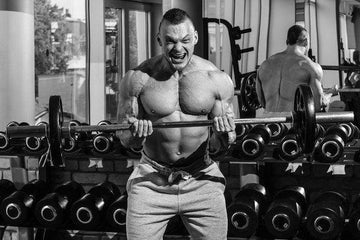

Erectile Dysfunction, Vitamin D and Bodybuilding
Table of Contents
| Erectile Dysfunction, Vitamin D and Bodybuilding |
By Paul Burton
Let’s be honest. The only time men want to talk about Erectile Dysfunction (ED) is in mockery of a Viagra commercial or when making light of someone else’s plight. Sadly, an estimated 25 to 30 million American men suffer in silence from (ED). Those susceptible, are aging men or those living a reckless unhealthy lifestyle. Even when afflicted, men do not want to bring it up. ED is something that happens to “older” guys and certainly not those that are active and train.
How many times have you asked a friend “Hey Bob, what’s new?” Bobs response, “Not good John, I have a severe case of ED!” It just doesn’t happen which is why articles like this are really important. You get to learn something on the “low.” Simply put, it’s an awkward and uncomfortable subject to even discuss with your doctor but it shouldn’t be.
For a long time, the presumed culprit in ED issues was some sort of psychological trauma. ED was treated as such or considered a normal condition associated with the normal aging process like baldness. However, recently urologists have suggested that physical factors may contribute to perhaps 90% of ED cases in men older than 50. It appears that influences other than age, such as overall physical activity, how much and how long one uses and abuses alcohol and smoking can affect ED to varying degrees of severity.
A condition known as atherosclerosis (the process of hardening the artery walls) has been shown to have a major impact in ED. Atherosclerosis is a disease in which the plaque builds up inside the arteries causing endothelial dysfunction. Those of you that buy nitric oxide boosters may be familiar with the term endothelial.
When penile endothelial cells become obstructed with plaque, these cells have diminished capacity to form nitric oxide. This situation adversely affects your ability to get a muscle pump, attain and sustain an erection. Thanks to Viagra, in spite of your condition you may attain an erection lasting for more than 4-hour but if you do, consult a physician.
Individuals with diseased coronary arteries are much more likely to experience erectile dysfunction compared to individuals without it and as expected, the afflicted demographic are aging men. However, younger men (those in their 20’s or 30’s) that abuse their bodies with drugs, alcohol, smoking etc. also experience ED even if it is for different reasons.
 The most common cause of ED is atherosclerosis of the penile artery. Hence, factors that prevent atherosclerosis also prevent ED so it stands to logic that both may share certain preventative treatment strategies. One such treatment may be supplementing with vitamin D. The most common cause of ED is atherosclerosis of the penile artery. Hence, factors that prevent atherosclerosis also prevent ED so it stands to logic that both may share certain preventative treatment strategies. One such treatment may be supplementing with vitamin D. |
The University of Milan has provided new data suggesting that low levels of vitamin D can be a significant factor in leading to ED. Vitamin D offers a myriad of benefits, however a vitamin D deficiency has been linked to a long-list of health conditions including atherosclerosis.
Vitamin D has been clinically shown play a critical role in the proper functioning of the endothelial cells that line blood vessels. In the event of a vitamin D deficiency, endothelial cells are susceptible to damage and dysfunction that ultimately contributing to the development of atherosclerosis as well as arterial calcification.
The link between vitamin D and atherosclerosis is obvious, hence encouraging Italian researchers conducted a study in 143 men with known ED conditions. In the study, the men were evaluated for penile atherosclerosis by ultrasound along with blood levels for vitamin D3 levels.
The results confirmed that most men with ED have low vitamin D levels and those with more severe ED had significantly lower vitamin D levels than those with mild ED. Vitamin D deficiency was also worse in those with ED due to penile atherosclerosis than in those men with ED due to other factors.
These results support the claim that low levels of vitamin D3 are linked to ED and indicate that vitamin D3 levels should be measured in men with ED. Supplementing with vitamin D may establish optimal blood levels of vitamin D3 and result in improved endothelial function. One might suggest that in some cases, supplementing with vitamin D may reduce/prevent ED.

| It seems reasonable to make certain observations from this discussion. The most obvious being, aging men experiencing ED should consider: |
· Refraining from activities that are damaging to ones overall health, i.e., excessive drinking, poor diet, smoking, lack of proper rest, etc.
· Adding activities that promote ones overall health, i.e., consulting a physician and openly discussing the issue and its degree of severity, improving diet, finding time to exercise on a regular basis, supplementing with vitamin D, etc.
Bodybuilders of all ages including those in there 20’s and 30’s also experience varying degrees of ED. The causes are rarely due to poor lifestyle choices and conduct, as “competing” Bodybuilders may be one of the most disciplined groups of athletes in the world.
When ED is an issue among bodybuilders, causes may be related to caloric deficits experienced during a pre-contest phase and extracurricular nontraditional supplementation. Now, ED can be experienced among “casual” bodybuilders ages ranging from there 20’s and 30’s: a demographic that should not experience issues. The cause may most likely be lifestyle related as previously discussed. The answer may be as simple as take your vitamins (especially vitamin D), say your prayers and go to bed at a reasonable hour.
Regardless, of age, lifestyle and severity of any presumed ED condition, supplementing with vitamin D will only help improve and in some cases even treat the condition.
With regard to dietary supplements, the obvious option is a standalone vitamin D supplement. Another option may be commonly “test booster” usually found in sports nutrition products. The latter is usually experimental but may of interest for a number of reasons.
Products in this category can promote sexual health and performance by enhancing a number of metabolic objectives, i.e., increasing serum testosterone levels, increasing unbound/free testosterone levels, modulating cortisol levels, improving estrogen metabolism, etc. If you do go this route look at the ingredients, dosage and make certain the formula is adequately dosed with vitamin D3.
MUSCLE MEDIA MAGAZINE FOR MEN
The premier source of training, nutrition, supplements, fat loss and health for men.

















